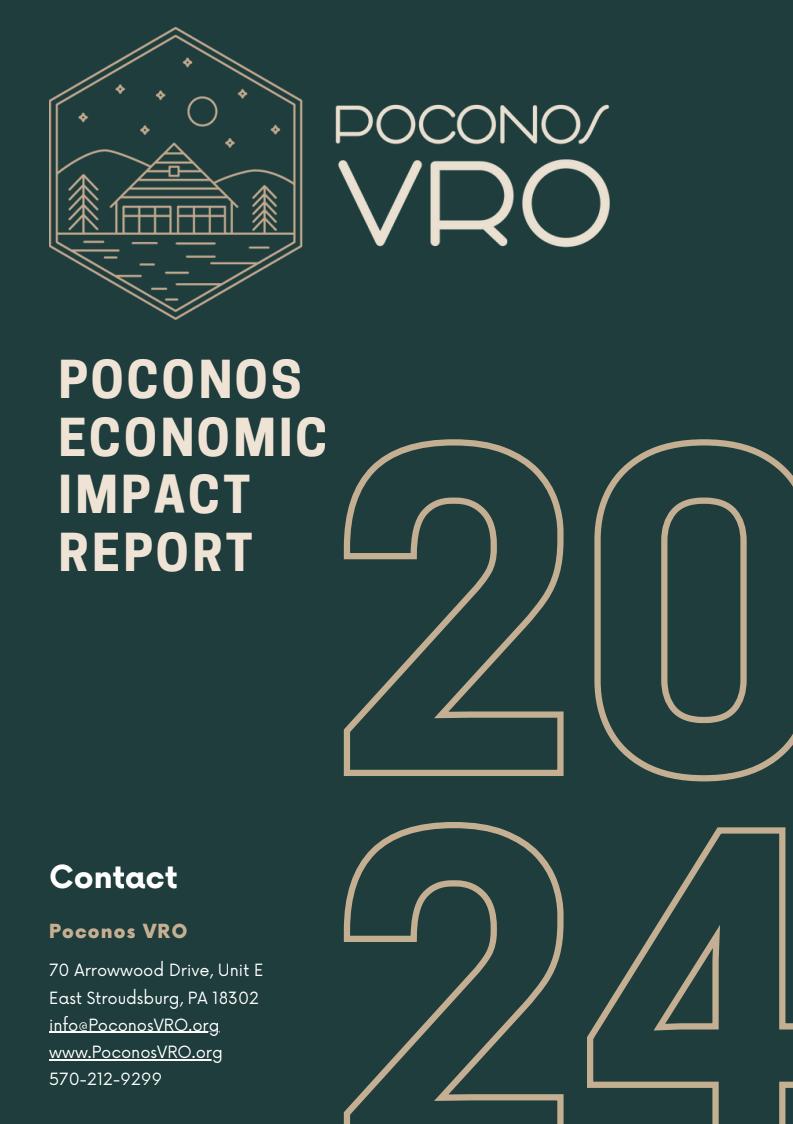Poconos Short-Term Rental Facts & Figures
ECONOMIC IMPACT
$1,500/YEAR
The amount STR taxes save every Poconos tax payer annually
35,818 JOBS
Tourism supports nearly 1/3 of all jobs in the Pocono Mountains and nearly 2/3 of Poconos labor income
$4.3 BILLION
Visitor spending in the Pocono Mountains annually.
STR OWNERS & MANAGERS
From the State of the STR Industry Study
MOM & POP
The industry is largely individual homeowners and small businesses. Of owners, 70% owned one STR, and of property managers, 54% managed 10 or fewer.
40%
Percentage of STR owners who also rent for mid-term stays to host non-leisure guests like traveling nurses, hospital patients, and remote workers
38.1%
On average, STR owners rely on their STR activity for 38.1% of their income, often to supplement retirement or help pay for major life expenses, like tuition.
TOOLS & DOWNLOADS
DOWNLOAD THE
POCONOS ECONOMIC IMPACT REPORT 2024
The Pocono region encompasses over 2,400 square miles, over 80 municipalities, with 150 lakes, hiking, biking, skiing, fishing, waterparks, 9 state parks, golf courses, with festivals and events all year long. Tourism is at the heart of keeping our work force and businesses surviving and thriving. For decades, vacation rentals have been the backbone of what drives people to come and experience the Pocono mountains.
This report details history and economic impact of vacation rentals throughout our communities.
Top 12 Reasons Hosts Start Hosting
1. They started renting short-term out of necessity to supplement income or cover costs.
“Iʼm a single parent of five. The kids and I rented a back unit at a duplex. The owner decided to sell and through the grace of God I was able to purchase the home. The house has been a rental for 40 years and was neglected. The money I make from [my] STR makes improvements on the property. I also manage and clean STRs on my street. This industry provides for my family and will provide retirement and college funds.”
“I needed a source of income after a divorce. Considering my age and being disabled, there were not many options.”
2. They purchased or inherited a future retirement home and/or began hosting to supplement retirement income.
“Our residence had a 1,500 [square foot] in-law suite which was unused and totally private. Property tax increases made retirement living in our home difficult. We now cover taxes and mortgage with [vacation rental] income.”
3. They inherited a family home or purchased a home for future family generations.
“We needed a larger home to start our family, and we have kept the rental home for a possible home for our children in the future.”
“Built as a second home for family in 2005. The market crashed, lost job and income, so had to convert this property into a full-time STR to prevent it from being taken by the bank. Now I love having it as a necessary and relatively easy investment to manage. Plan to retire in the STR in eight years.”
4. They were asked by someone else for help managing their STR.
5. They had problems with long-term renters.
“Long-term rentals were not working out at the property we owned due to tenants not addressing maintenance items and being a long-term issue to the neighbors.”
6. They needed temporary or seasonal space to house or care for others, such as aging family members, and short-term rented the space when it was vacant.
“To pay for a ministry to veterans with PTSD/TBI who stay in our property free of charge while undergoing treatment.”
“I built an ADU for my parents to move into, but they donʼt need it full time yet so we STR when they are not here.”
7. They had to relocate but wanted to keep the property.
“Moved but wanted to keep our house—we put a lot of work/detail into our property, and short-term rental guests take such good care of it. Honestly, wouldnʼt feel comfortable with traditional renters. Also love that it allows us to go back and visit whenever we would like to (or whenever we have extra house projects, etc., we want to take care of).”
8. They invested in real estate for wealth generation or financial stability.
9. They wanted or needed to cover the costs of renovations, repairs, or restorations.
“I bought a single-family home on a teacherʼs salary. There was an existing studio which I renovated to pay for constant necessary repairs.”
10. They had extra space, such as an ADU or guest cottage, that they wanted to optimize.
11. They traveled often or for extended durations and rented the home when away.
“Stay in it ourselves up to six months a year and use the income for health insurance and health expenses.”
12. They loved and enjoyed hospitality and meeting new people.
“I have always loved the hospitality industry. Once introduced to my first rental, I was hooked. For me, it is all about the experiences that we create for our guests.”
From the State of the STR Industry Study

